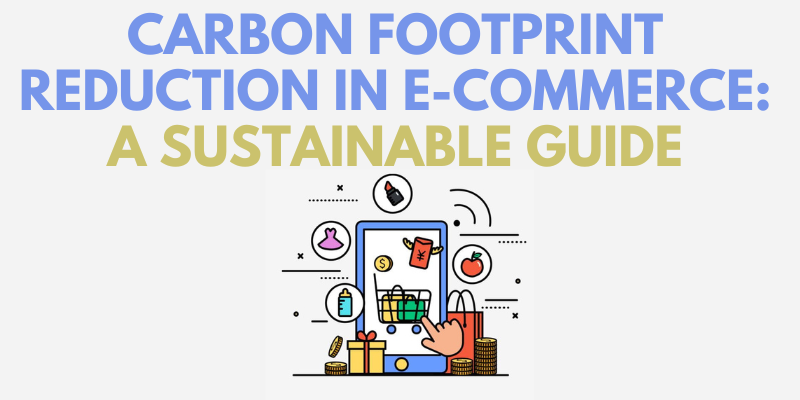Carbon Footprint Reduction in E-Commerce: A Sustainable Guide
As the e-commerce industry continues to grow, so does its environmental impact. E-commerce businesses often rely on extensive logistics, packaging materials, and energy consumption, contributing to carbon emissions and resource depletion. In this article, we will cover the significance of implementing sustainable e-commerce practises, as well as eco-friendly tactics that may help businesses minimise their carbon footprint while preserving profitability and customer pleasure.
The Environmental Challenge
Increased demand for delivery and shipping services has resulted in increasing greenhouse gas emissions from transportation. Additionally, the excessive use of single-use plastics and packaging materials has raised concerns about waste and pollution. E-commerce businesses, especially those operating within the framework of MBA In Digital Marketing, must recognize and actively address these environmental challenges to effectively mitigate their environmental impact and foster more sustainable practices in the digital marketing and e-commerce sectors.
Reducing Packaging Waste
Eco-Friendly Packaging: E-commerce businesses can use eco-friendly packaging materials like recycled cardboard, biodegradable plastics, or reusable packaging. This reduces the environmental effect of discarded packaging.
Optimal Packaging: Right-sizing packages can minimize empty space, reducing the number of materials used and lowering shipping costs.
Sustainable Supply Chain
Local Sourcing: Partnering with local suppliers reduces transportation emissions and supports regional economies. It’s an eco-conscious approach that resonates with environmentally conscious consumers.
Inventory Management: Efficient inventory management minimizes overproduction, which can lead to excess waste and resource consumption. Leveraging data analytics and sophisticated demand forecasting techniques is essential for MBA Digital Marketing In Chennai to optimize inventory levels.
Eco-Friendly Shipping and Delivery
Alternative Fuels: Transitioning delivery fleets to run on alternative fuels like electric or hydrogen can significantly reduce carbon emissions associated with transportation.
Last-Mile Solutions: Innovations like bike couriers, delivery lockers, and consolidated delivery routes can make the last mile of delivery more sustainable.
Customer Education and Engagement
Transparency: Businesses should communicate their sustainability efforts transparently to customers. Sharing information about eco-friendly packaging, carbon offset programs, and sustainable sourcing can build trust and loyalty.
Green Options: Offering green shipping options, such as slower but more sustainable delivery methods, gives customers the choice to reduce their carbon footprint.
Measuring and Reducing Carbon Footprint
Carbon Offsetting: E-commerce companies can invest in carbon offset programs to compensate for emissions produced during shipping and operations.
Data Analytics: Employ data analytics to track and analyze carbon emissions across the supply chain. This data can guide efforts to reduce emissions.
Conclusion
Sustainable e-commerce practices are no longer optional; they are a necessity for businesses looking to thrive in a world increasingly focused on environmental responsibility. Reducing the carbon footprint of e-commerce operations benefits not only the planet but also the bottom line. It attracts environmentally conscious customers, reduces operational costs through efficiency improvements, and mitigates risks associated with environmental regulations and resource scarcity.
Businesses must prioritise sustainability as a major component of their operations as the e-commerce sector evolves. By adopting eco-friendly packaging, optimizing supply chains, promoting green shipping options, engaging customers in sustainability efforts, and actively measuring and reducing their carbon footprint, e-commerce businesses can lead the way in building a more sustainable future for online retail. Ultimately, sustainable e-commerce practices are not just about reducing environmental impact; they are also about creating a better and more responsible business model that benefits both the planet and its inhabitants.

